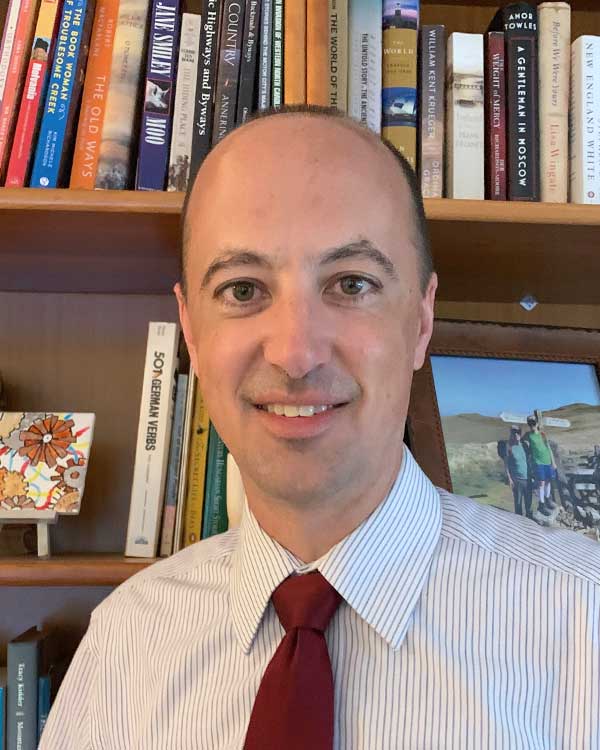Learn how to think profoundly and communicate clearly about societal issues and existential human questions through research, reading, writing and discussion.
What You’ll Study
The Religious Studies Program will teach students to think profoundly and communicate clearly about societal issues and existential human questions through research, reading, writing, and discussion. Students will develop a mature understanding of Judeo-Christian traditions and a deep appreciation for other major religions.
The Religious Studies major prepares students for responsible participation in a pluralistic, globally-oriented society, within the framework of the diverse learning community that is North Carolina Wesleyan University.

Faculty & Staff
Email any of our advisors with any questions you have about completing this program.
Andrew Stern, Ph.D.
Professor of Religious Studies/Program Coordinator, Religious Studies/Study Abroad Coordinator

Andrew Stern, Ph.D.
Shane Thompson, Ph.D.
Associate Professor of the Bible & the Ancient Near East

Shane Thompson, Ph.D.
Students in the Religious Studies program will develop a mature understanding of Judeo-Christian traditions and a deep appreciation for other major religions. These courses are designed for students to think profoundly and communicate clearly about societal issues and existential human questions. Students are expected to develop strong critical thinking and analytical reasoning skills through a vigorous exploration of religious issues, ideas, and topics. The courses stress writing and speaking skills as the means to communicate information and analysis.
Here are some highlighted courses included in the Religious Studies Major:
REL 195 – The Archaeology of Religion
Students will become familiar with basic concepts in the archaeology of religion. Theoretical and methodological readings will include ritual studies, symbols and semiotics, and the archaeology of sacred space and landscapes. The course will emphasize the archaeology of Middle Eastern, African, Pacific Island, and New World religions alongside Mediterranean, European, East Asian, and contemporary American evidence by means of case studies ranging from prehistoric practices through religiously-charged twentieth-century sites. This is a “hands-on” course where students will use clay to make religious figurines, play ancient board games, learn how to write ancient scripts, etc.
REL 309 – Religion in United States Cultures
From Plymouth Rock to rock ‘n roll, the Civil War to Civil Rights, Rev. Billy Graham to Rev. Timothy Lovejoy – religion permeates American culture and history. This course will examine how religious traditions and ideas have both shaped, and been shaped by, the evolution of America. The course will consist of two interwoven parts. The first part will offer a chronological overview of the development of various religious traditions in America, stretching from American Indian religions to the pluralistic religious landscape of the twenty-first century. Because religious history cannot be separated from history more generally, this section will emphasize the relation between religious institutions and shifting social, political, and economic contexts. The second part of the course will offer a thematic exploration of the intersection between religion and other aspects of American culture such as sports, music, and economics. While the first part addresses the nature of American religion, the second focuses on different ways of conceptualizing religion itself. Taken together, these two approaches will allow us to understand and to challenge traditional ways of thinking about religion and history, both within and beyond the American context.
REL 401 – Sacred Art
This course introduces students to some of the ways in which religious believers have expressed their faiths artistically throughout history. It focuses on visual arts in the Hindu, Jewish, Christian, and Islamic traditions. The course includes visits to the North Carolina Museum of Art and the National Gallery of Art in Washington, D.C.
REL 495 – Israelite Religion: History, Texts, and Archaeology
This course will examine some of the major historical and religious debates in the field of ancient Israel by engaging with both the textual and archaeological evidence. Students will learn to weigh the textual and archaeological evidence equally in order to engage in these debates. Students will also learn how to engage with comparative evidence from other ancient cultures and visit the ancient world collection at the North Carolina Museum of Art.
REL 495 – The Bible and Film
This course will examine the practice of biblical interpretation through the medium of film. Students will learn how to read biblical texts closely then compare them to the versions of these stories depicted through film. Students will also engage with the different versions of these ancient stories, learning that even ancient audiences interpreted these stories in a variety of ways.
Curriculum Structure: Explore Broadly, Specialize Deeply
The Bachelor of Arts in Religious Studies at North Carolina Wesleyan University is grounded in a curriculum that equips students with the tools to think critically about religion’s role in society, history, and culture. This religious studies degree offers both structure and flexibility, giving students a broad foundation in global religious traditions while allowing for deeper exploration in areas of individual interest.
Required Courses
All students pursuing a bachelor’s in Religious Studies begin with a core sequence designed to introduce major world religions, foundational texts, and key methods in the academic study of religion. Courses such as Introduction to Religion or Religious Worlds build essential knowledge early in the program. Later in the degree, the capstone Seminar in Religion and Philosophy helps students synthesize their coursework while reflecting on academic, ethical, and professional goals.
Exploring Broadly
The first part of the BA in Religious Studies focuses on breadth. Students complete coursework across diverse traditions and themes, including Judeo-Christian texts, Eastern religions, Indigenous belief systems, Christian ethics, and religion in American public life. Courses like Religions of the East, Contemporary Moral Issues, and Religion in United States Culture develop cultural literacy and the ability to engage with complex topics across belief systems.
Specializing Over Time
As students move deeper into the program, they choose from advanced courses in specialized areas such as biblical studies, ethical reasoning, historical theology, and religion and archaeology. This structure allows students to align their studies with their intellectual and professional goals while gaining expertise in a chosen focus area.
Learning by Doing
Many courses include active learning components that bring the subject matter to life. Students may analyze ancient texts, study religious art, visit museums, engage in classroom debates, or conduct independent research. These experiences reinforce critical thinking, research, and communication skills that translate directly into both graduate-level work and the professional world. Graduates of the Bachelor of Arts in Religious Studies program leave with a strong academic foundation and a deep understanding of how religion shapes human experience.
What are the courses like in Religious Studies at NCWU?
Check out our latest university catalog for learning goals, course descriptions and suggested plans of study for NC Wesleyan University’s Religious Studies Programs.
Connecting Career Pathways with a Religious Studies Degree
A Bachelor of Arts in Religious Studies from North Carolina Wesleyan University prepares students for meaningful, purpose-driven careers across a wide range of industries. Since this is a truly interdisciplinary liberal arts program, it cultivates versatile skills that are valued in both professional and academic settings.
This religious studies degree emphasizes critical thinking, effective communication, ethical reasoning, and cultural literacy. These skills are essential for navigating complex issues, leading teams, interpreting diverse perspectives, and solving real-world problems. Whether your goal is to work directly with communities, shape public policy, support nonprofit organizations, or continue into graduate studies, this program builds the foundation for lifelong impact.
Graduates with a bachelor’s in religious studies often pursue careers in fields such as:
- Law and Public Policy
- Clergy or Ministry
- Nonprofit Leadership
- Family and Mental Health Counseling
- Education and Academic Research
- Community Development
- Journalism and Writing
- Interfaith or International Relations
Our alumni have a strong job placement record, and many also continue their education in graduate programs related to theology, divinity, counseling, or social work. North Carolina Wesleyan University maintains partnerships with institutions such as Duke Divinity School to help students transition seamlessly into graduate-level study, including the Hybrid Master of Divinity (MDiv-H) or the Master of Arts in Christian Practice (MACP) degree.
Wondering what you can do with a degree from NCWU’s Religious Studies major? Check out these resources from NCWU Career Development & Leadership and the Occupational Information Network (O*NET).
Supporting Your Professional Growth
Wesleyan is dedicated to assisting students in their professional development, offering resources and guidance for hands-on learning experiences through internships, assignments within the courses and job search resources. Let us help you focus on your education and career at the same time!
24/7 Tutoring Services. Free & Easy.
North Carolina Wesleyan University is partnered with Brainfuse, a complimentary online tutoring service, provided to all Wesleyan students. This service is available 24 hours a day, seven days a week and features live tutoring in the subjects of writing, reading, math, computer and technology, science and business.
Student Organizations
Be engaged at NCWU!
Choose from 30+ student-led clubs and organizations to connect with other students who share your academic interests or… create your own.
Transfer Articulation Agreements
To simplify the transfer process, NC Wesleyan University has a number of partnerships with other community colleges, universities and institutions that allow students to enroll at NCWU with simple pathways. These agreements outline the courses you should take to prepare for transferring to NCWU. Review the full list of transfer articulation agreements to see if your institution is listed.




